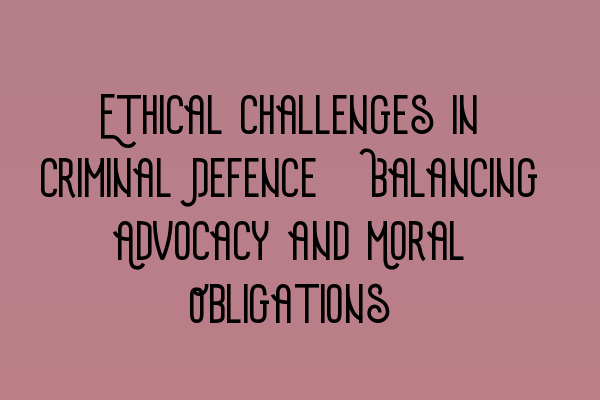Ethical Challenges in Criminal Defence: Balancing Advocacy and Moral Obligations
As criminal defence solicitors, we are faced with a unique set of ethical challenges. Our role is to provide legal representation to individuals who have been accused of committing crimes. We are bound by professional codes of conduct that guide our actions and ensure that we uphold our moral obligations. However, there are instances where advocating for our clients’ best interests may conflict with our personal moral beliefs. In this article, we will explore the ethical dilemmas faced by criminal defence solicitors and the importance of balancing advocacy with moral obligations.
The Duty of Advocacy
As solicitors, our primary duty is to advocate for our clients. This means presenting their case to the best of our abilities, ensuring that their rights are protected, and challenging the prosecution’s evidence. We are tasked with ensuring a fair trial and securing the best possible outcome for our clients. This duty requires us to act as zealous advocates, leaving no stone unturned in our pursuit of justice.
However, this obligation to advocate for our clients can sometimes lead to difficult ethical dilemmas. For example, what happens when we believe our client is guilty but still need to represent them to the best of our abilities? How do we reconcile our duty to advocate with our moral obligations?
Moral Obligations
As solicitors, we have a duty to act in the best interests of justice and maintain the public’s trust in the legal system. This duty extends beyond our obligations to our clients. We must consider the impact of our actions on society as a whole and uphold the principles of fairness, integrity, and respect for the law.
There are instances where our moral obligations may conflict with our duty to advocate. For example, we may have personal beliefs about the severity of a crime or the impact it has on victims. In such cases, we must navigate the delicate balance between advocating for our clients and acting in accordance with our own moral compass.
The Importance of Balancing Advocacy and Moral Obligations
Balancing advocacy and moral obligations is paramount to maintaining the integrity of the legal profession. It is essential for solicitors to recognize and address ethical challenges in criminal defence to ensure fair representation and uphold the principles of justice.
One way to navigate these challenges is through open and transparent communication with our clients. We must clearly explain our duties and limitations as solicitors, and ensure that our clients understand the ethical framework within which we operate. This includes discussing the potential conflicts that may arise between advocacy and moral obligations.
Furthermore, continuing professional development and ongoing education are crucial for solicitors to stay abreast of ethical considerations in criminal defence. By staying informed about changes in the law and engaging in ethical discussions, solicitors can better navigate the challenges they encounter in their practice.
Conclusion
Ethical challenges in criminal defence require solicitors to strike a delicate balance between advocacy and moral obligations. While our duty is to zealously represent our clients, we must also act in the best interests of justice and maintain our moral compass. Navigating these challenges requires open communication with clients, ongoing education, and a commitment to upholding the principles of fairness, integrity, and respect for the law.
For more information on the solicitors qualifying examination and other related topics, refer to the following articles:
- SQE Exam Prep: Essential Study Materials for Aspiring Solicitors
- Demystifying the Solicitors Qualifying Examination Format
- SQE Exam for International Lawyers: Challenges and Success Strategies
- LLC Formation Made Simple: Step-by-Step Guide for UK Entrepreneurs
- LLC Formation: A Step-by-Step Guide for UK Entrepreneurs
